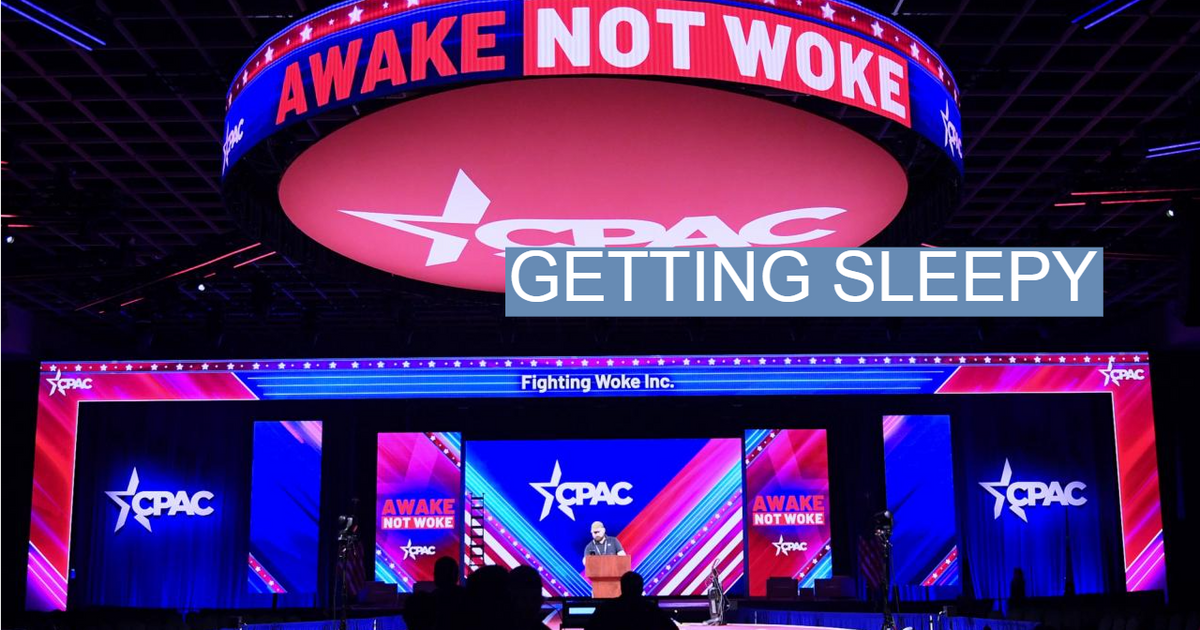
The decline of “wokeness” as a catch-all Republican message that spoke to intense fears of progressive ideas taking over institutions had been happening for a while. It faded for three reasons — Trump’s return to the national spotlight, the middling electoral impact of anti-wokeness messaging, and the legislative victories that local Republicans achieved before the presidential race got underway.
In Trump’s case, there were strategic reasons to push “woke” out of the conservative conversation early. The less seriously Republican voters took the concept as a threat, the less tempted they might be to consider a candidate like DeSantis running to protect them from it. At the end of May, DeSantis entered the race, and within two weeks Trump was using a speech in suburban Des Moines to demean his rival’s defining issue.
“I don’t like the term woke, because I hear woke, woke, woke,” Trump told conservatives in Urbandale. “It’s like, just a term they use. Half the people can’t even define it.”
DeSantis saw that for what it was — Trump attacking an opponent’s perceived strength. The Florida governor had defeated what he called “a woke corporation in Burbank, California” (Disney), which no other candidate could say. Haley, then polling in single digits, was trying to get to his right on “parental rights” legislation, saying that Florida’s “Don’t Say Gay” bill didn’t “go far enough.” But Trump said that the messaging was weird and irrelevant, and plenty of primary voters took their cues from him.
In many states, Republicans convinced their voters they had already turned back the tide of creeping wokeness with their support. That was a factor in Iowa, where an education bill mirroring Florida’s passed this summer. In the governments they controlled, Republicans had passed laws against public schools teaching “divisive” ideas about race and gender identity. By the time Scott was campaigning against “critical race theory” in Iowa, it had been banned in public schools for two years.
Progressives weren’t talking as much about it, either. After a June boycott of Bud Light, which had done a single promotion with a transgender influencer, and a June boycott of Target, which had displayed LGBTQ pride clothing near the front of its stores, those companies retreated. In June, the conservative Supreme Court majority ended affirmative action, which also bolstered an effort to end diversity, equity and inclusion policies at businesses. The next month, The Wall Street Journal reported companies had laid off thousands of DEI officers since 2020 as their work became more politically divisive and corporate budgets tightened.
“My sense is that ‘woke’ is receding,” said Sohrab Ahmari, the author of “Tyranny, Inc.,” whose 2019 criticism of drag queen story hours presaged years of conservative activism. “Anti-woke only really works in a dialectic where woke is a powerful force.”
Politically, the “woke” conversation produced some anxiety among centrist Democrats, especially after Virginia Gov. Glenn Youngkin’s 2021 win, but has had few actual consequences at the ballot box. Democrats overperformed in the midterms and a well-financed attempt to weaponize policy debates around transgender minors and athletes flopped in key states like Michigan.
Then came the off-year elections, where candidates backed by teachers’ unions won most of the races they were competing in. In the most contentious races, candidates squaring up against anti-woke conservatives portrayed themselves as the defenders of good school standards, and their opponents as book-banning ideologues.
In suburban Philadelphia, where a conservative school board had passed a series of anti-woke policies — restrictions on sexually explicit material in libraries, and rules requiring parents to be notified if their child identifies as transgender — Democrats won in a rout. In Virginia’s Loudoun County, progressives won a majority while defending the system’s diversity standards. Conservatives, they said, had misread the electorate.
“I understand their fear, but a lot of it is not realizing what the real challenges in the schools are,” said Anne P. Donohue, a Democrat who won a seat on Loudoun County’s school board, in an interview before the election. “We’re facing learning loss. We’re facing absenteeism. We’re facing emotional immaturity from kids whose education was stunted. These are big problems that we’re facing, and everybody’s screaming about bathrooms?”
Moms for Liberty’s Justice said that this was a misreading — teachers’ unions had far more to spend, they argued, an advantage that couldn’t be overcome in a couple of years. “They love the off-year cycle, because they can get their people out to vote,” Justice said. “More people are waking up every day. And you’re going to see us win more races in the future and take more power away from the teachers’ unions. They’re scared out of their minds.”
